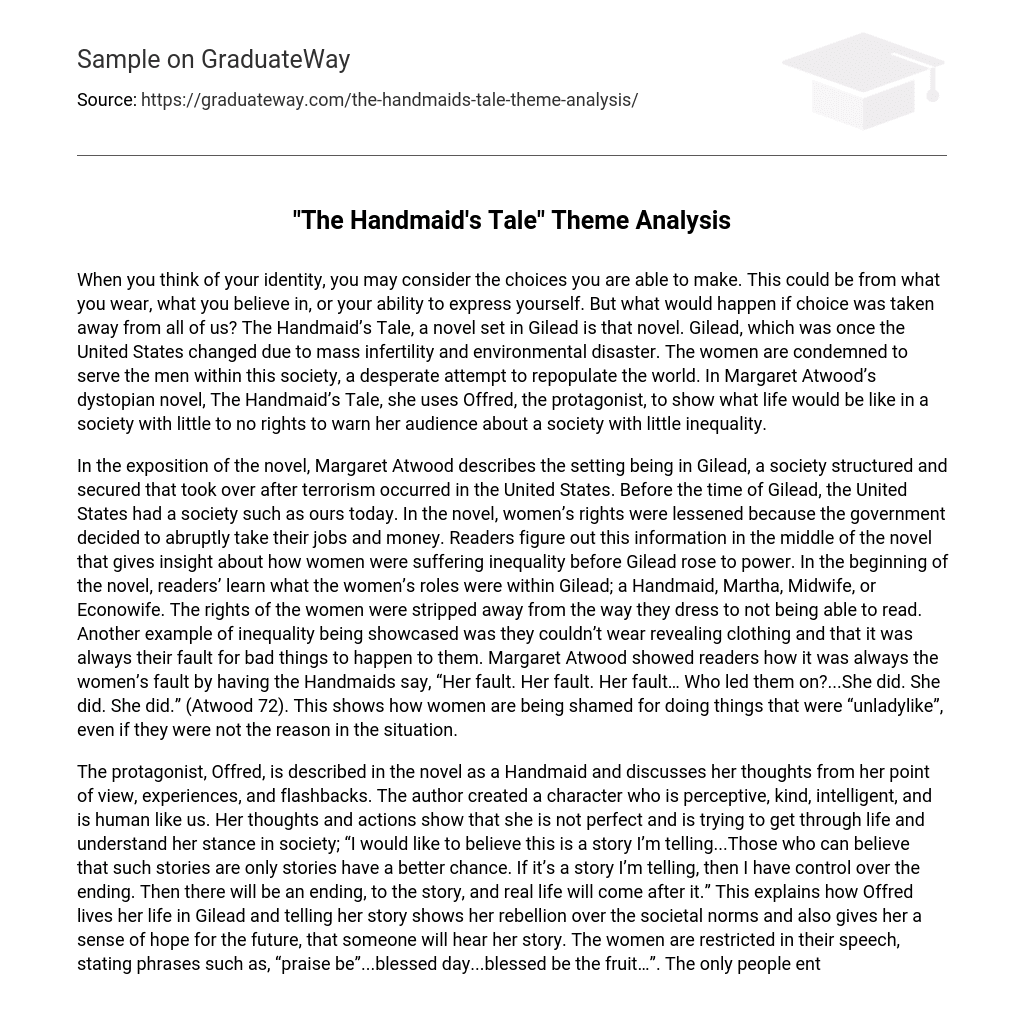When you think of your identity, you may consider the choices you are able to make. This could be from what you wear, what you believe in, or your ability to express yourself. But what would happen if choice was taken away from all of us? The Handmaid’s Tale, a novel set in Gilead is that novel. Gilead, which was once the United States changed due to mass infertility and environmental disaster. The women are condemned to serve the men within this society, a desperate attempt to repopulate the world. In Margaret Atwood’s dystopian novel, The Handmaid’s Tale, she uses Offred, the protagonist, to show what life would be like in a society with little to no rights to warn her audience about a society with little inequality.
In the exposition of the novel, Margaret Atwood describes the setting being in Gilead, a society structured and secured that took over after terrorism occurred in the United States. Before the time of Gilead, the United States had a society such as ours today. In the novel, women’s rights were lessened because the government decided to abruptly take their jobs and money. Readers figure out this information in the middle of the novel that gives insight about how women were suffering inequality before Gilead rose to power. In the beginning of the novel, readers’ learn what the women’s roles were within Gilead; a Handmaid, Martha, Midwife, or Econowife. The rights of the women were stripped away from the way they dress to not being able to read. Another example of inequality being showcased was they couldn’t wear revealing clothing and that it was always their fault for bad things to happen to them. Margaret Atwood showed readers how it was always the women’s fault by having the Handmaids say, “Her fault. Her fault. Her fault… Who led them on?…She did. She did. She did.” (Atwood 72). This shows how women are being shamed for doing things that were “unladylike”, even if they were not the reason in the situation.
The protagonist, Offred, is described in the novel as a Handmaid and discusses her thoughts from her point of view, experiences, and flashbacks. The author created a character who is perceptive, kind, intelligent, and is human like us. Her thoughts and actions show that she is not perfect and is trying to get through life and understand her stance in society; “I would like to believe this is a story I’m telling…Those who can believe that such stories are only stories have a better chance. If it’s a story I’m telling, then I have control over the ending. Then there will be an ending, to the story, and real life will come after it.” This explains how Offred lives her life in Gilead and telling her story shows her rebellion over the societal norms and also gives her a sense of hope for the future, that someone will hear her story. The women are restricted in their speech, stating phrases such as, “praise be”…blessed day…blessed be the fruit…”. The only people entitled to their speech is the men in the society. Before Gilead, Offred was able to have her own thoughts and speech, but now suffers from not being able to state what she wants. Now she fears punishment or saying the wrong thing because Gilead further reinforces the regime’s power.
This novel is unique because it doesn’t reflect on what might happen in the future, but what has happened in the past and that it may happen again in an exaggerated way. Offred’s fate is not made clear by the author because readers do not know if going into the car had the “Eyes” that are bad or people to help her. The resolution of this story was that scholars discuss what life was like in Gilead from the perspective that Offred provided. The main chairperson of this conference is a woman, “Keynote Speaker: Professor James Darcy Pieixoto, Director…” (299), showing readers that women have rights to read and think on their own in the next hundred years.
Remember, Margaret Atwood is warning our society of inequality and dominance men may have over women. There is hierarchy, taking away people’s original names, no free speech, and people are being held captive in this society. This dystopian novel is unique in that it warns readers of what has happened and that it can happen again. We see the protagonist, Offred, change within this novel. She grows because she learns more about her past to understand who she is as a person now. At the end of the novel, she escapes Gilead to accomplish freedom or possibly getting caught by the authority. The novel demonstrates that your rights might be here today but can be easily taken in an instant, specifically for the women. When you think of your ability of free will and speech, think of Offred in the Handmaid’s Tale because we have the ability to choose but we must chose wisely.





